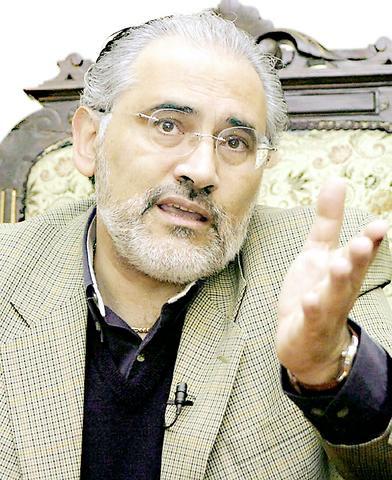Bolivians headed to the polls yesterday for a referendum that the president hopes will give the impoverished South American nation guidance on what to do with its immense natural gas reserves.
Despite protests by some 200 highland Indians, who burned tires and strewed rocks along main roads outside of the capital on Friday and Saturday, there was a general calm nationwide on the eve of the referendum as stores and transit operated normally.
President Carlos Mesa shrugged off the protests in El Alto, a city of 800,000 on the high plains above the capital, as "minuscule radical groups," during a news conference on Saturday.

PHOTO: EPA
He also rejected suggestions that he step down if the referendum, mandatory for Bolivia's 4.4 million registered voters, fails to heal social wounds.
The referendum comes nine months after a popular revolt ousted former president Gonzalo Sanchez de Lozada for planning to export liquefied natural gas to Mexico and California.
Bolivia's constitution lifted Mesa from the vice presidency to serve out the remainder of Sanchez de Lozada's term through 2007. Mesa immediately offered the
referendum.
Valued at more than US$70 billion, the gas fields in this landlocked country are South America's richest after those in Venezuela.
The gas ought to be an economic watershed for Bolivia, one of the poorest nations on the continent, with one of the continent's highest proportions of Indians -- some 55 percent of the nation's 8.7 million people.
Lured by privatization of the industry, some 20 foreign companies have invested US$3.5 billion in exploration, discovering some 1.56 trillion meters3 of gas. That's enough by some estimates to cover Bolivia's needs for a thousand years and raise incomes in a nation where two-thirds of the population make less than US$2 a day.
But the reserves have split the nation, with Andean Indians in the western highlands at odds with business leaders of European descent in the eastern and southern lowlands. In the east and southeast, home to the gas reserves, business leaders are set on exportation and have threatened to secede from the less developed highlands.
Indigenous and labor leaders in the west want the entire gas industry nationalized -- an option Mesa left off the ballot.
"We totally reject this crooked referendum," said 60-year-old Luis Sanchez, standing in a brown felt fedora, sweater and slacks in El Alto on Saturday.
The ballot asks Bolivians five questions, among them whether the gas should be exported. It also asks whether Bolivia should use the gas reserves to negotiate for access to the Pacific coast lost during its 1879 to 1884 war with Chile.
Political analysts say the real test for Mesa will come in about six months. By then the Congress will have had time to start drafting legislation based on the outcome of yesterday's vote.
"One of the problems is that Bolivia is already exporting gas to Brazil and Argentina," said Fernando Molina, editor of weekly political newspaper Pulso.

A fire caused by a burst gas pipe yesterday spread to several homes and sent a fireball soaring into the sky outside Malaysia’s largest city, injuring more than 100 people. The towering inferno near a gas station in Putra Heights outside Kuala Lumpur was visible for kilometers and lasted for several hours. It happened during a public holiday as Muslims, who are the majority in Malaysia, celebrate the second day of Eid al-Fitr. National oil company Petronas said the fire started at one of its gas pipelines at 8:10am and the affected pipeline was later isolated. Disaster management officials said shutting the

US Vice President J.D. Vance on Friday accused Denmark of not having done enough to protect Greenland, when he visited the strategically placed and resource-rich Danish territory coveted by US President Donald Trump. Vance made his comment during a trip to the Pituffik Space Base in northwestern Greenland, a visit viewed by Copenhagen and Nuuk as a provocation. “Our message to Denmark is very simple: You have not done a good job by the people of Greenland,” Vance told a news conference. “You have under-invested in the people of Greenland, and you have under-invested in the security architecture of this

Japan unveiled a plan on Thursday to evacuate around 120,000 residents and tourists from its southern islets near Taiwan within six days in the event of an “emergency”. The plan was put together as “the security situation surrounding our nation grows severe” and with an “emergency” in mind, the government’s crisis management office said. Exactly what that emergency might be was left unspecified in the plan but it envisages the evacuation of around 120,000 people in five Japanese islets close to Taiwan. China claims Taiwan as part of its territory and has stepped up military pressure in recent years, including

UNREST: The authorities in Turkey arrested 13 Turkish journalists in five days, deported a BBC correspondent and on Thursday arrested a reporter from Sweden Waving flags and chanting slogans, many hundreds of thousands of anti-government demonstrators on Saturday rallied in Istanbul, Turkey, in defence of democracy after the arrest of Istanbul Mayor Ekrem Imamoglu which sparked Turkey’s worst street unrest in more than a decade. Under a cloudless blue sky, vast crowds gathered in Maltepe on the Asian side of Turkey’s biggest city on the eve of the Eid al-Fitr celebration which started yesterday, marking the end of Ramadan. Ozgur Ozel, chairman of the main opposition Republican People’s Party (CHP), which organized the rally, said there were 2.2 million people in the crowd, but